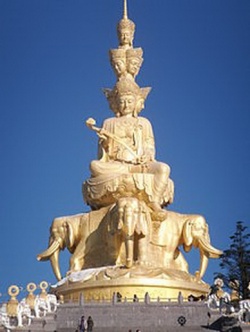Bhagavan
bhagavan (Skt; Tib: chom-dän-dä)
Epithet for a buddha; sometimes translated as Lord, Blessed One and so forth. One who has destroyed (chom) all the defilements, possesses all qualities (dän) and has transcended the world (dä).
Bhagavan (Skt. bhagavant; Tib. བཅོམ་ལྡན་འདས་, chomdendé; Wyl. bcom ldan ‘das) — an epithet of the Buddha. It is usually explained by Tibetan scholars according to its literal meaning in
Tibetan as "the transcendent འདས་(dé) one who has vanquished བཅོམ་ (chom) the four maras and possesses ལྡན་ (den) the six fortunes." The Sanskrit word
carries the sense of possessing fortune (bhaga). The term has been translated into English as 'blessed one', 'lord', or, following the Tibetan, 'transcendent and accomplished conqueror.'
Bhagavan (Bhagavant): also rendered “the Auspicious One” or “the Exalted One”; the most frequent appellation of the Buddha, though not restricted to Buddhist usage.
Commentary
The great Dzogchen master Shri Singha, in his commentary on the Heart Sutra, explains the term based on its Tibetan translation according to three levels of meaning:
- On an ordinary level, it signifies the conquering (chom) of the four maras, possession (den) of the six paramitas and transcendence (dé) of mistaken states of mind.
- On a deeper level, it signifies the conquering of ordinary appearance and existence within the pure perception of the deity, possession of ultimate realization, and the transcendence of ordinary clinging.
- On the highest level, it signifies the effortless conquering of all the phenomena of samsara and nirvana within their essential nature, possession of the great wisdom of self-knowing awareness, and the transcendence of dualistic notions or extremes regarding samsara or nirvana since they lack any real identity.
Source
Bhagavan, also written Bhagwan or Bhagawan, from the Sanskrit nt-stem bhaga-vant- (nominative भगवान् Bhagavān) literally means "possessing Fortune, blessed, prosperous" (from the noun bhaga, meaning "Fortune, Wealth", cognate to Slavic bog "God", Russian богатый (boga'ch) "wealthy"), and hence "illustrious, divine, Venerable, holy", etc.
In some traditions of Hinduism it is used to indicate the Supreme Being or Absolute Truth, but with specific reference to that Supreme Being as
possessing a personality (a personal God). This personal feature indicated in Bhagavan differentiates its usage from other similar terms such as Brahman, the "Supreme Spirit" or "spirit", and thus, in this usage, Bhagavan is in many ways analogous to the general Christian conception of God.
Bhagavan used as a title of veneration is often translated as "Lord", as in "Bhagavan Rama", "Bhagavan Krishna", "Bhagavan Shiva", "Bhagavan Swaminarayan", etc. In Buddhism and Jainism,
Gautama Buddha, Mahavira and other Tirthankaras, Buddhas and Bodhisattvas are also venerated with this title. The feminine of Bhagavat is Bhagawatī and is an Epithet of Durga and other goddesses.
The title is also used by a number of contemporary Spiritual teachers in India who claim to be Bhagavan or have realized impersonal Brahman.
Definitions
The Bhagavata Purana (1.2.11) states the definition of Bhagavan to mean the supreme most being:
The Learned Know the Absolute Truth call this nondual substance Brahman, Paramatma or Bhagavan.
The Sanskrit word bhagavan is explained in the Vishnu Purana (6.5.79) by the great authority, Parashara Muni, the father of Vyasa Deva, defines Bhagavan as one who possesses six opulences completely, as follows:
The Supreme Personality who possesses all riches, all strength, all Fame, all Beauty, all Knowledge and all Renunciation is called Bhagavan.
There are many persons who are very rich, very powerful, very beautiful, very famous, very learned, and very much detached, but no one can claim that he possesses all riches, all strength, etc., entirely.
Early epigraphical evidence
Bhagavat
The Bhāgavat Religion of early Hinduism is documented epigraphically from around 100 BCE, such as in the inscriptions of the Heliodorus pillar, in which Heliodorus, an Indo-Greek ambassador from Taxila to the court of a Sunga king, describes himself as a Bhagavata ("Heliodorena bhagavatena"):
This Garuda-standard of Vasudeva (Vishnu), the God of Gods was erected here by the Bhagavata Heliodoros, the son of Dion, a man of Taxila, sent by the Great Greek (Yona) King Antialcidas, as ambassador to King Kasiputra Bhagabhadra, the Savior son of the princess from Benares, in the fourteenth year of his reign."
(Archaeological Survey of India, Annual Report (1908-1909))
In Buddhism
The word "Bhagava" is used many times to refer to The Buddha in the Pali suttas. The term "Bhagava" has been used in Pali Anussati or recollections as one of the terms that describes the "Tathagatha".
In The Buddha Anussati, Bhagavan is defined the following way:
Iti pi so Bhagavā
Thus is Buddha,
1) Arahaṃ - Deserving homage.
2) Sammā-sambuddho - Perfectly Awakened.
3) Vijjā-caraṇa sampanno - Perfect in true Knowledge and conduct.
4) Sugato - well gone (to Nibbana)
5) Lokavidū - knower of the worlds
6) [[Anuttaro purisa-damma-sārathi] - incomparable leader (lit. charioteer) of persons to be tamed.
7) Satthā Deva-manusānaṃ - teacher of gods and humans.
8) Buddho - Awakened one.
9) Bhagavāti - Blessed One.
Sākamunisa bhagavato is recorded in the kharoshthi Dedication of a vase placed in a Buddhist Stupa by the Greek meridarch (civil governor of a province) named Theodorus (Tarn, p391):
"Theudorena meridarkhena pratithavida ime Sarira sakamunisa bhagavato bahu-jana-stitiye":
"The meridarch Theodorus has enshrined relics of Lord Shakyamuni, for the welfare of the mass of the people"
(Swāt relic vase inscription of the Meridarkh Theodoros

